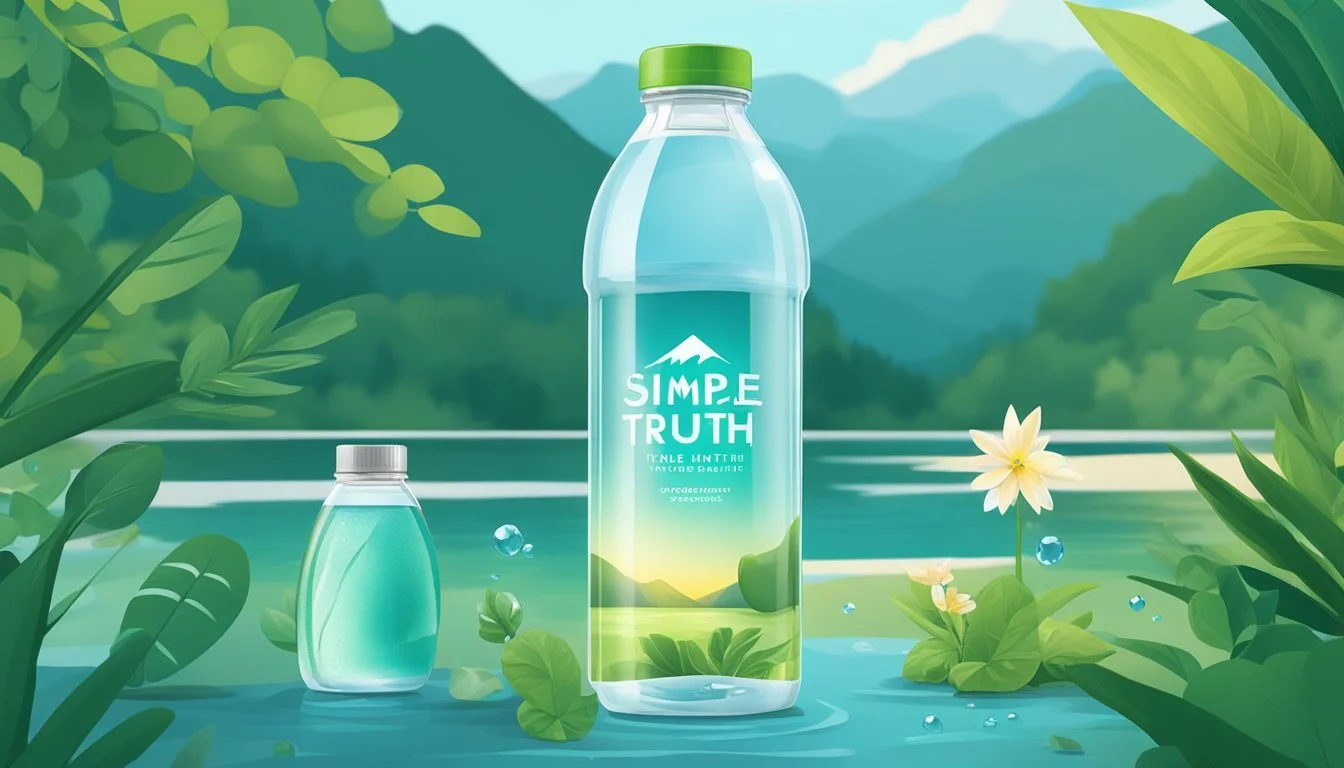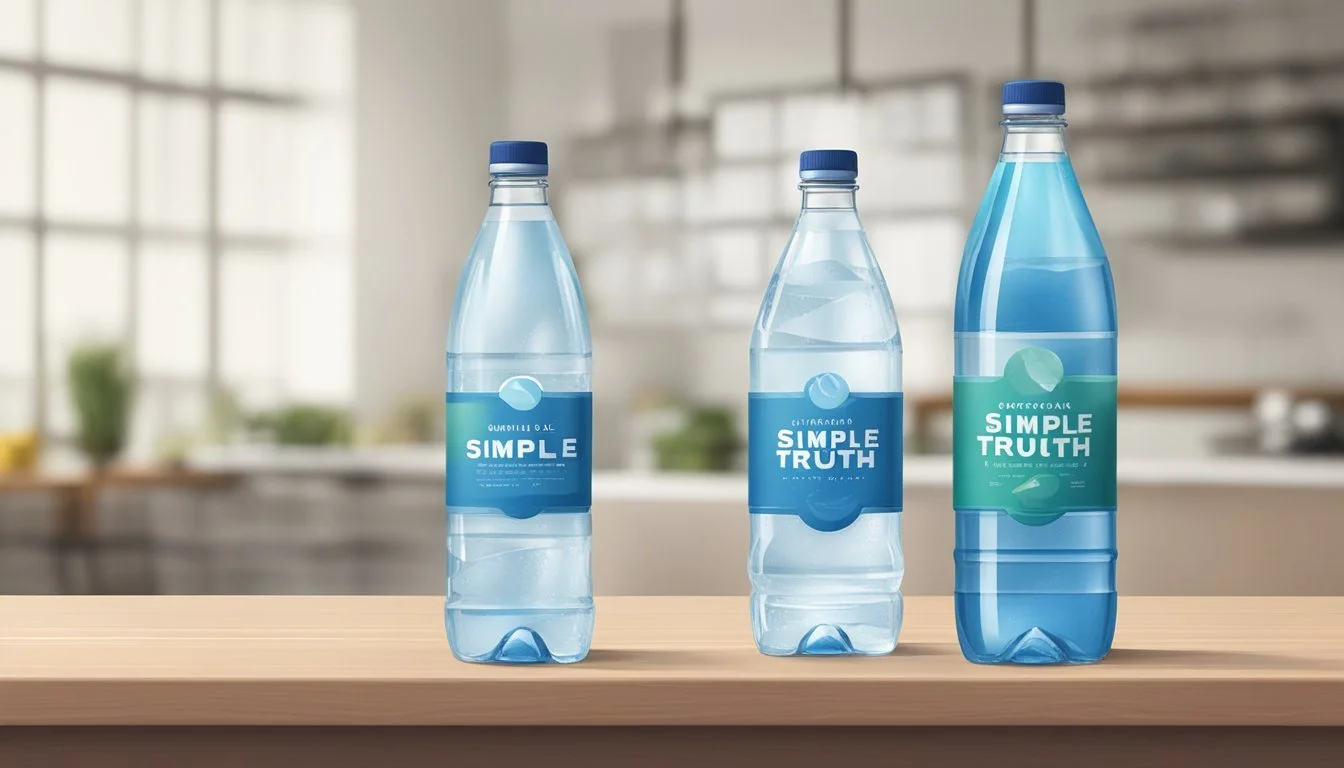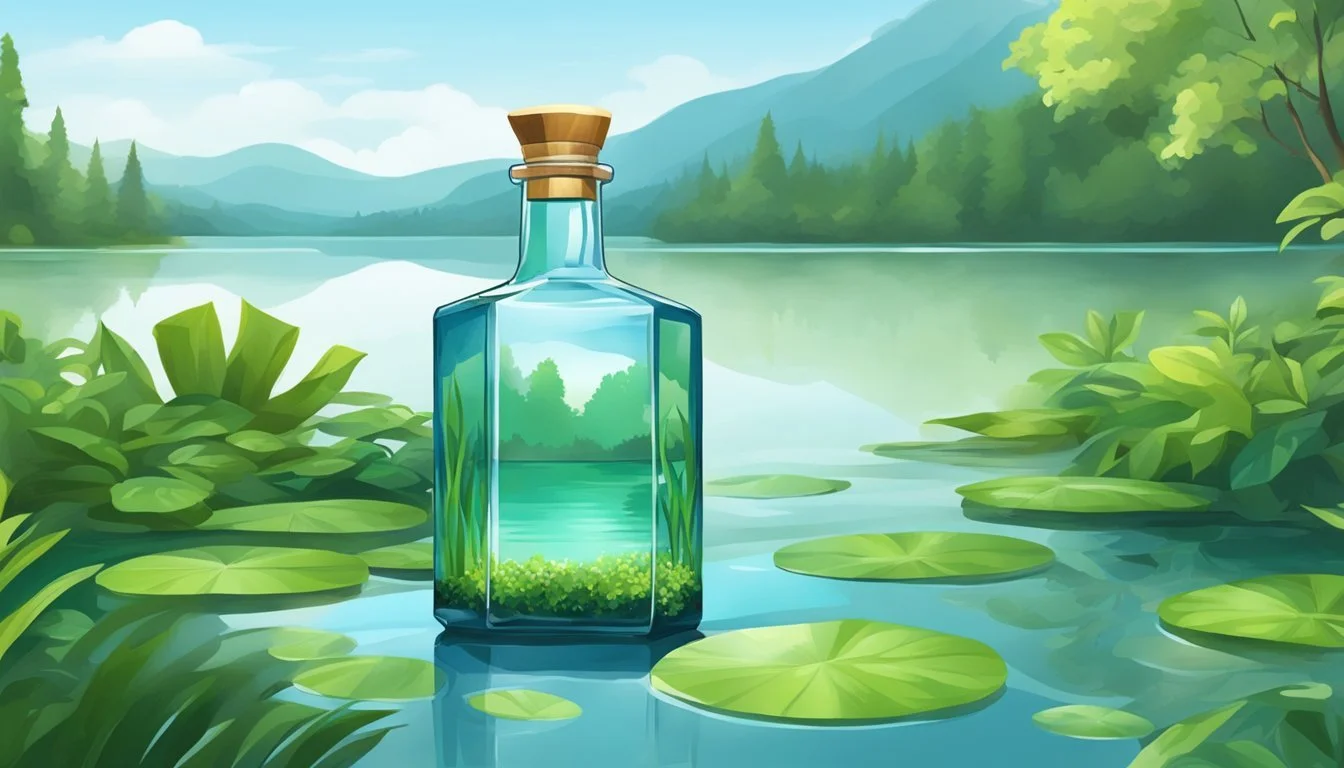Simple Truth vs. Crystal Lake
A Clear Comparison of Bottled Waters
In the ever-expanding market of bottled water, two brands stand out: Simple Truth and Crystal Lake. Simple Truth, a Kroger brand, offers spring water sourced from Michigan, characterized by a subtle sweetness reminiscent of burnt sugar. On the other hand, Crystal Lake, with its natural spring origins, provides a distinct and fresh flavor that many find appealing for its natural essence.
While Simple Truth focuses on offering a familiar and affordable option, Crystal Lake's balanced mineral profile and inclusion of electrolytes like sodium, magnesium, and potassium give it an edge for those seeking specific hydration benefits. The choice often boils down to personal taste preferences and the nutritional benefits the consumer is looking for.
For consumers who prioritize a natural taste and balanced minerals, Crystal Lake might be the preferable choice. Those who prefer a straightforward, slightly sweet water might lean towards Simple Truth. Both brands find their unique niche in the crowded bottled water market, catering to different tastes and hydration needs.
The Importance of Hydration and the Role of Bottled Water
Staying hydrated is essential for maintaining many of the body’s critical functions. Bottled water, with its stringent quality standards, plays a significant role in ensuring individuals have access to clean and safe hydration.
Understanding Hydration Needs
Hydration is vital for the body's proper functioning. Water regulates body temperature, lubricates joints, and aids in digestion. Insufficient water intake can impair cognitive function and reduce physical performance.
Daily water intake can vary based on factors like age, gender, and activity level. For adults, a general recommendation is about 8 cups (64 ounces) per day, but this can be higher for those who exercise or live in hot climates.
Staying hydrated can prevent symptoms like headaches, fatigue, and dizziness. It's important to listen to the body’s signals, such as thirst, which indicates the need for water intake.
Benefits of Bottled Water for Hydration
Bottled water offers distinct benefits for hydration. It undergoes stringent testing and safety standards, making it a reliable source of clean water. This minimizes the risk of contamination from bacteria such as coliform.
Due to its convenience, bottled water can be easily carried and consumed on-the-go, helping individuals maintain their hydration levels throughout the day. This is particularly beneficial for those who lead busy lives or travel frequently.
High-quality bottled water also often contains essential minerals that contribute to overall health. Brands like Simple Truth and Crystal Lake can offer different mineral compositions, giving consumers options based on their preferences and health needs.
Simple Truth vs. Crystal Lake: Brand Overview
This section explores the profiles, market presence, and consumer perceptions of the bottled water brands Simple Truth and Crystal Lake. It focuses on key aspects such as brand reputation, product range, and consumer satisfaction.
Simple Truth: Brand Profile
Simple Truth is Kroger's largest and most successful private label brand, launched in 2012. The brand is known for offering certified organic and natural products across a wide range, including bottled water. Simple Truth aims to provide healthy, clean options at competitive prices.
Its focus is on avoiding artificial ingredients, ensuring transparency about product contents. This appeal to health-conscious consumers has made Simple Truth a popular choice in the crowded bottled water market.
Crystal Lake: Brand Profile
Crystal Lake bottled water is known to focus on purity and quality. Despite mixed reviews, it maintains a solid customer base. Questions have been raised about the transparency of its treatment process, earning low scores from the Environmental Working Group (EWG).
Crystal Lake does not heavily market its water as organic or health-oriented. Instead, it relies on a reputation for being a straightforward bottled water option at various price points. This makes it accessible but potentially less appealing to consumers seeking premium quality or organic certifications.
Market Presence and Consumer Perception
Simple Truth leverages Kroger's extensive retail network, which provides broad market penetration. The brand's emphasis on organic and natural products resonates with a consumer base that prioritizes health and sustainability. It benefits from Kroger's strong brand reputation and vast distribution channels.
Crystal Lake, while less transparent about its treatment processes, sustains a steady presence in the market. Its affordability and availability in different retail contexts attract a segment of consumers less concerned with organic labels. Despite criticisms, it remains a recognizable player due to its consistent availability and pricing strategies.
The comparison highlights differing brand strategies and market appeals, reflecting consumer priorities from health and environmental consciousness to affordability and basic water needs.
Assessing Source and Water Quality
When comparing Simple Truth and Crystal Lake, evaluating the source and quality of water includes key aspects such as the type of water, mineral content, presence of contaminants, and adherence to standards.
Spring Water versus Purified Water
Simple Truth sources its water from natural springs, emphasizing natural purity. This type, known as spring water, naturally rises to the earth's surface, or is collected via boreholes.
Crystal Lake uses purified water, which undergoes filtration processes to remove impurities. Sources often include municipal tap water. The choice between these depends on preference for natural minerals versus ultra-clean processing.
Mineral Content and Health Benefits
Spring water from Simple Truth often contains natural minerals like calcium, magnesium, and potassium. These contribute to both flavor and potential health benefits, supplying electrolytes that aid bodily functions.
Crystal Lake's purified water may lack such mineral content, potentially being re-mineralized after filtration. The presence of beneficial minerals varies, and consumers looking for mineral-rich options might find Simple Truth more appealing.
Presence of Contaminants
Simple Truth adheres to stringent checks, though natural sources can risk contamination from environmental factors. Tests often check for lead and other heavy metals, ensuring compliance with standards like FDA regulations.
Crystal Lake's purification reduces contamination risk, but the initial source must also be checked for pollutants. Purified methods are designed to eliminate potential contaminants, providing a cleaner option.
Standards and Certifications
Both brands must meet the International Bottled Water Association and World Health Organization standards for water quality. Simple Truth focuses on maintaining the natural characteristics of spring water, while Crystal Lake ensures thorough purification.
Certifications from these organizations indicate rigorous quality control, guaranteeing that both bottled waters are safe for consumption. Meeting these standards is essential for ensuring public safety and trust.
Comparing Taste Profiles
Crystal Lake and Simple Truth bottled waters are compared based on their taste profiles, which depend heavily on factors like mineral content and individual consumer preferences.
Taste Evaluation Factors
Several factors influence the taste profiles of bottled water, including mineral content, source, and purification process.
Simple Truth often undergoes extensive filtration, resulting in a clean, neutral taste.
Crystal Lake, sourced from natural springs, retains its mineral content, offering a more distinct taste.
A water sommelier could detect these nuances, differentiating the subtle flavors that vary between the brands.
Role of Minerals in Taste
Mineral content significantly impacts the taste of bottled water.
Crystal Lake contains minerals like calcium and magnesium, contributing to a crisp and slightly sweet flavor.
In contrast, Simple Truth's extensive filtration removes most minerals, leading to a straightforward, pure taste.
Mineral balance can enhance or diminish certain flavor notes, making water more appealing to some consumers based on their taste preferences.
Consumer Taste Preferences
Consumer preferences for bottled water taste vary widely.
Some prefer the neutrality and purity of Simple Truth, finding it refreshing and uncomplicated.
Others seek the minerality and character of Crystal Lake, appreciating the nuanced flavors.
Personal preference often depends on individuals' taste sensitivity and their experiences with different water sources.
Water sommeliers highlight that tasting bottled water should be as nuanced as tasting wine, with attention to each unique flavor profile.
Environmental Impact and Sustainability Practices
In comparing Simple Truth and Crystal Lake bottled water, key factors include their packaging choices, sourcing methods, and sustainable initiatives. Each brand's approach to minimizing environmental impact through eco-friendly practices is vital.
Packaging Choices and Environmental Concerns
Simple Truth and Crystal Lake use various packaging types, with differences in environmental impact. Simple Truth often uses plastic bottles, which pose challenges for waste management and recycling. Plastic is lightweight but contributes to plastic pollution if not properly recycled.
Crystal Lake has adopted glass bottles in addition to plastic, offering a more sustainable option. Glass is recyclable indefinitely, reducing waste. However, glass is heavier, increasing transportation emissions.
Key points: Both brands need to improve plastic recycling programs and explore biodegradable alternatives. Simple Truth focuses heavily on reducing plastic waste, while Crystal Lake’s use of glass bottles shows commitment to long-term sustainability.
Sustainable Sourcing and Production
Simple Truth sources its water from natural springs, emphasizing minimal environmental disruption. Their production processes aim to conserve water and energy. Simple Truth also prioritizes local sourcing, reducing the carbon footprint associated with transportation.
Crystal Lake engages in practices to ensure sustainable water extraction. The brand invests in technologies to minimize water waste and enhance efficiency. Crystal Lake’s production facilities adhere to stringent environmental regulations, focusing on renewable energy sources to reduce emissions.
Key points: While both brands prioritize sustainable water sourcing, Simple Truth’s focus on local sourcing helps diminish their carbon footprint. Crystal Lake’s investment in advanced technologies shows a dedication to continuous improvement in sustainability.
Eco-friendly Initiatives by Brands
Simple Truth has launched several initiatives to promote sustainability. These include partnerships with environmental organizations, educational campaigns about recycling, and efforts to offset carbon emissions through reforestation projects.
Crystal Lake places a strong emphasis on eco-friendly packaging innovations. They have introduced new bottle designs that use less material, thereby decreasing waste. Crystal Lake also supports community clean-up efforts and engages in research to develop more sustainable packaging solutions.
Key points: Simple Truth and Crystal Lake both show a commitment to the environment through unique initiatives. Simple Truth’s educational and reforestation efforts complement Crystal Lake’s focus on packaging innovation and community involvement. Both brands are working towards a more sustainable future.
Technological Advancements in Bottled Water Production
Recent technological advancements in bottled water production have significantly improved the quality, safety, and environmental impact of bottled water. These advancements span from enhanced filtration and purification processes to innovative packaging solutions that prioritize sustainability and consumer health.
Filtration and Purification Processes
Modern bottled water production employs advanced filtration techniques to ensure product purity. Reverse osmosis has become a standard, effectively removing contaminants, salts, and other impurities. This process involves forcing water through a semi-permeable membrane that blocks dissolved solids.
Additionally, UV treatment and ozone disinfection are used to eliminate bacteria and viruses without leaving chemical residues. These methods complement traditional filtration, providing an extra layer of safety.
Carbon filtration is another common method used to improve taste by removing chlorine and other organic compounds. Collectively, these advanced methods ensure that the bottled water consumers get is of the highest quality.
Enhancement of Mineral Profile
Enhancing the mineral profile of bottled water is crucial for both taste and health benefits. Technologies now allow precise control over the addition of essential minerals, such as calcium, magnesium, and potassium.
Electrodialysis is one of the techniques used in this process. It involves using electrical current to regulate mineral content, maintaining the desired balance while removing excess ions.
Producers often enhance water to target specific consumer needs—like promoting hydration or supporting bone health. This customization ensures that bottled water can cater to a variety of preferences and health requirements, making it not just a convenience but also a functional beverage option.
Innovation in Packaging
Innovations in packaging have made significant strides towards sustainability and consumer safety. BPA-free plastic bottles are now standard, ensuring that harmful chemicals do not leach into the water.
Additionally, sustainable packaging solutions like biodegradable bottles and recyclable materials are becoming more common. These materials reduce environmental impact and encourage eco-friendly practices.
Tech advancements have also optimized packaging design for better storage and transportation efficiency. Lightweight bottles save on transportation costs and energy, contributing to a smaller carbon footprint. Smart packaging technologies, including tamper-evident seals and QR codes for tracking, further ensure consumer safety and product transparency.
The Differentiating Factors of Simple Truth and Crystal Lake
Simple Truth and Crystal Lake bottled waters exhibit notable distinctions in their pH levels, mineral content, purification processes, and flavor varieties, which influence their overall quality and consumer preference.
pH Level and Alkalinity
Simple Truth water generally has a balanced pH level, typically around 7.5 to 8.5, falling within the mildly alkaline range. This slight alkalinity is believed to support better hydration and neutralize acidity in the body.
Crystal Lake, on the other hand, often maintains a neutral pH of 7. While neither brand markets as highly alkaline water, the relatively minor difference in pH levels can affect consumer choice, particularly among those seeking alkaline water benefits.
Mineralization and Its Effects
Simple Truth boasts a natural mineral content, which includes essential minerals like calcium, magnesium, and potassium. These minerals not only contribute to the taste but also offer health benefits such as improved bone density and muscle function.
Crystal Lake water is also mineral-rich, but the specific mineral composition may vary subtly. Both brands emphasize their mineral balance, though Simple Truth’s mineral content is often perceived as more distinctive due to clearer labeling and marketing.
Brand-Specific Purification Techniques
Simple Truth utilizes a multi-stage purification process that includes reverse osmosis, UV light treatment, and carbon filtration. This rigorous system ensures the removal of contaminants while preserving beneficial minerals.
Crystal Lake follows a traditional purification method, often relying on source-specific techniques tailored to their water’s unique properties. Their processes usually include filtration, ozonation, and sometimes additional steps to maintain purity, which are communicated transparently on labels.
Flavor Varieties and Special Editions
Simple Truth offers several flavor varieties beyond their standard water, including options with added electrolytes and natural essences, appealing to a health-conscious demographic. Seasonal and limited-edition flavors are periodically introduced, enhancing the brand's appeal.
Crystal Lake focuses primarily on their core product but does release flavored options occasionally. These include citrus-infused or berry-flavored waters, catering to those looking for a subtle taste alternative without compromising hydration quality.
These differentiating factors highlight the unique characteristics and advantages of Simple Truth and Crystal Lake, guiding consumers in choosing the bottled water that best fits their needs.
Consumer Considerations in Choosing Bottled Water
When selecting bottled water, consumers weigh several key factors such as taste, purity, cost, and health benefits. This comparison delves into the elements that influence their decisions.
Taste Versus Purity: Making the Choice
Taste and purity often drive personal preferences in bottled water. Crystal Lake offers a mineral-rich profile, providing a distinct taste. On the other hand, Simple Truth is often praised for its clean, flavorless experience, making it suitable for those who prioritize purity.
Consumers sensitive to the taste of minerals may prefer Simple Truth. For those enjoying a nuanced flavor, Crystal Lake's mineral content can be more appealing.
Cost Factors and Accessibility
Cost and accessibility are significant considerations for many buyers. Simple Truth typically offers competitive pricing, catering to budget-conscious consumers. Crystal Lake could be priced higher due to its premium positioning and mineral content.
Accessibility, influenced by distribution channels, also matters. Simple Truth is often found in various retail outlets, making it more accessible. Crystal Lake might be available in select stores or online, impacting ease of purchase.
Lifestyle and Health Considerations
Health-conscious individuals pay attention to the benefits and potential risks of their chosen bottled water. Simple Truth markets itself on being free from harmful chemicals and pollutants, aligning with those seeking purity and safety.
Crystal Lake’s mineral content can contribute beneficially to bodily functions but may not be ideal for everyone, such as those needing low-mineral water for specific health reasons.
For active lifestyles, hydration needs dictate the choice. Simple Truth’s straightforward purity suits everyday hydration, while Crystal Lake’s added minerals might appeal to those looking for extra nutrients.
The Future of Bottled Water Industry
The bottled water industry faces significant changes driven by consumer trends, sustainable packaging innovations, and a critical focus on global water scarcity.
Trends in Consumer Preferences
Consumer preferences are increasingly leaning towards sustainability and health. There is a growing demand for natural and purified water options without added flavors or sweeteners.
Health Concerns: People are more conscious about the source and quality of their water. Brands emphasizing purity and mineral content are gaining popularity.
Sustainability: Eco-conscious consumers prefer brands that adopt sustainable practices, such as using recycled materials for packaging and reducing plastic waste.
Millennials and Gen Z consumers are particularly influential in driving these trends, prioritizing eco-friendly choices and transparency around product sourcing.
Advancements in Eco-friendly Packaging
Eco-friendly packaging is a critical area of innovation in the bottled water industry. Companies are exploring new materials and designs to reduce their environmental footprint.
Biodegradable Plastics: Research and development are focusing on plastics that break down more quickly and safely in the environment.
Recycled Materials: Many brands are increasing the percentage of recycled content in their bottles, some reaching up to 100%.
Innovative Designs: Alternatives like plant-based bottles, aluminum cans, and boxed water are being introduced to offer more sustainable options.
These advancements aim to address consumer demands for environmentally responsible products and mitigate the detrimental impact of single-use plastics.
Impact of Global Water Scarcity
Global water scarcity is a pressing issue that significantly affects the bottled water industry. Increasing water shortages have led to a more scrutinized water sourcing process.
Sustainable Sourcing: Companies are investing in technologies and practices that ensure water is sourced responsibly. Groundwater management and preservation are critical areas of focus.
Ethical Practices: Brands are being held accountable for their water use, particularly in regions experiencing severe droughts. Ethical sourcing practices are becoming a market differentiator.
Policy and Regulation: Governments and international bodies are implementing stricter regulations to ensure that water extraction doesn’t adversely affect local communities and ecosystems.
These factors necessitate a balance between meeting consumer demand and conserving vital water resources, shaping the industry’s future sustainability efforts.
Conclusion
Simple Truth and Crystal Lake offer distinct bottled water choices for consumers.
Simple Truth markets itself on purity and sustainability, highlighting its rigorous filtration and eco-friendly packaging. Consumers who prioritize environmental impact may lean towards this brand.
Crystal Lake takes pride in its natural spring source. The water has a crisp, clean taste that draws those who favor a natural hydration experience.
Here's a quick comparison:
Aspect Simple Truth Crystal Lake Source Purified, eco-conscious processing Natural spring Taste Profile Pure, smooth Crisp, clean Packaging Eco-friendly materials Standard plastic bottling pH Level Neutral Neutral
Consumers' choice ultimately depends on personal preferences.
Readers should weigh these factors to make an informed decision. Each brand appeals to different priorities, whether it's taste, environmental impact, or purity.
More About Simple Truth
Aqua Carpatica vs Simple Truth: Which Bottled Water is Better?
Cascade Mountain vs Simple Truth: Which Bottled Water is Better?
Core Hydration vs Simple Truth: Which Bottled Water is Better?
Crystal Geyser vs Simple Truth: Which Bottled Water is Better?
Hawaii Volcanic vs Simple Truth: Which Bottled Water is Better?
Hawaiian Springs vs Simple Truth: Which Bottled Water is Better?
Ice Mountain vs Simple Truth: Which Bottled Water is Better?
Icelandic Glacial vs Simple Truth: Which Bottled Water is Better?
Liquid Death vs Simple Truth: Which Bottled Water is Better?
Mountain Valley Spring Water vs Simple Truth: Which Bottled Water is Better?
Nestle Pure Life vs Simple Truth: Which Bottled Water is Better?
Poland Spring vs Simple Truth: Which Bottled Water is Better?
Purely Sedona vs Simple Truth: Which Bottled Water is Better?
Richard's Rainwater vs Simple Truth: Which Bottled Water is Better?
San Pellegrino vs Simple Truth: Which Bottled Water is Better?
Simple Truth vs Essence pH10: Which Bottled Water is Better?
Simple Truth vs Kirkland Signature: Which Bottled Water is Better?
Simple Truth vs Proud Source: Which Bottled Water is Better?
Simple Truth vs Talking Rain AQA: Which Bottled Water is Better?
Simple Truth vs Whole Foods 365: Which Bottled Water is Better?
Solan de Cabras vs Simple Truth: Which Bottled Water is Better?
Whole Foods Italian Still Mineral water vs Simple Truth: Which Bottled Water is Better?
More About Crystal Lake
Aqua Carpatica vs Crystal Lake: Which Bottled Water is Better?
Cascade Mountain vs Crystal Lake: Which Bottled Water is Better?
Core Hydration vs Crystal Lake: Which Bottled Water is Better?
Crystal Geyser vs Crystal Lake: Which Bottled Water is Better?
Crystal Lake vs Essence pH10: Which Bottled Water is Better?
Crystal Lake vs Proud Source: Which Bottled Water is Better?
Hawaii Volcanic vs Crystal Lake: Which Bottled Water is Better?
Hawaiian Springs vs Crystal Lake: Which Bottled Water is Better?
Ice Mountain vs Crystal Lake: Which Bottled Water is Better?
Icelandic Glacial vs Crystal Lake: Which Bottled Water is Better?
Kirkland Signature vs Crystal Lake: Which Bottled Water is Better?
Liquid Death vs Crystal Lake: Which Bottled Water is Better?
Mountain Valley Spring Water vs Crystal Lake: Which Bottled Water is Better?
Nestle Pure Life vs Crystal Lake: Which Bottled Water is Better?
Poland Spring vs Crystal Lake: Which Bottled Water is Better?
Purely Sedona vs Crystal Lake: Which Bottled Water is Better?
Richard's Rainwater vs Crystal Lake: Which Bottled Water is Better?
San Pellegrino vs Crystal Lake: Which Bottled Water is Better?
Solan de Cabras vs Crystal Lake: Which Bottled Water is Better?
Talking Rain AQA vs Crystal Lake: Which Bottled Water is Better?
Whole Foods 365 vs Crystal Lake: Which Bottled Water is Better?
Whole Foods Italian Still Mineral water vs Crystal Lake: Which Bottled Water is Better?









